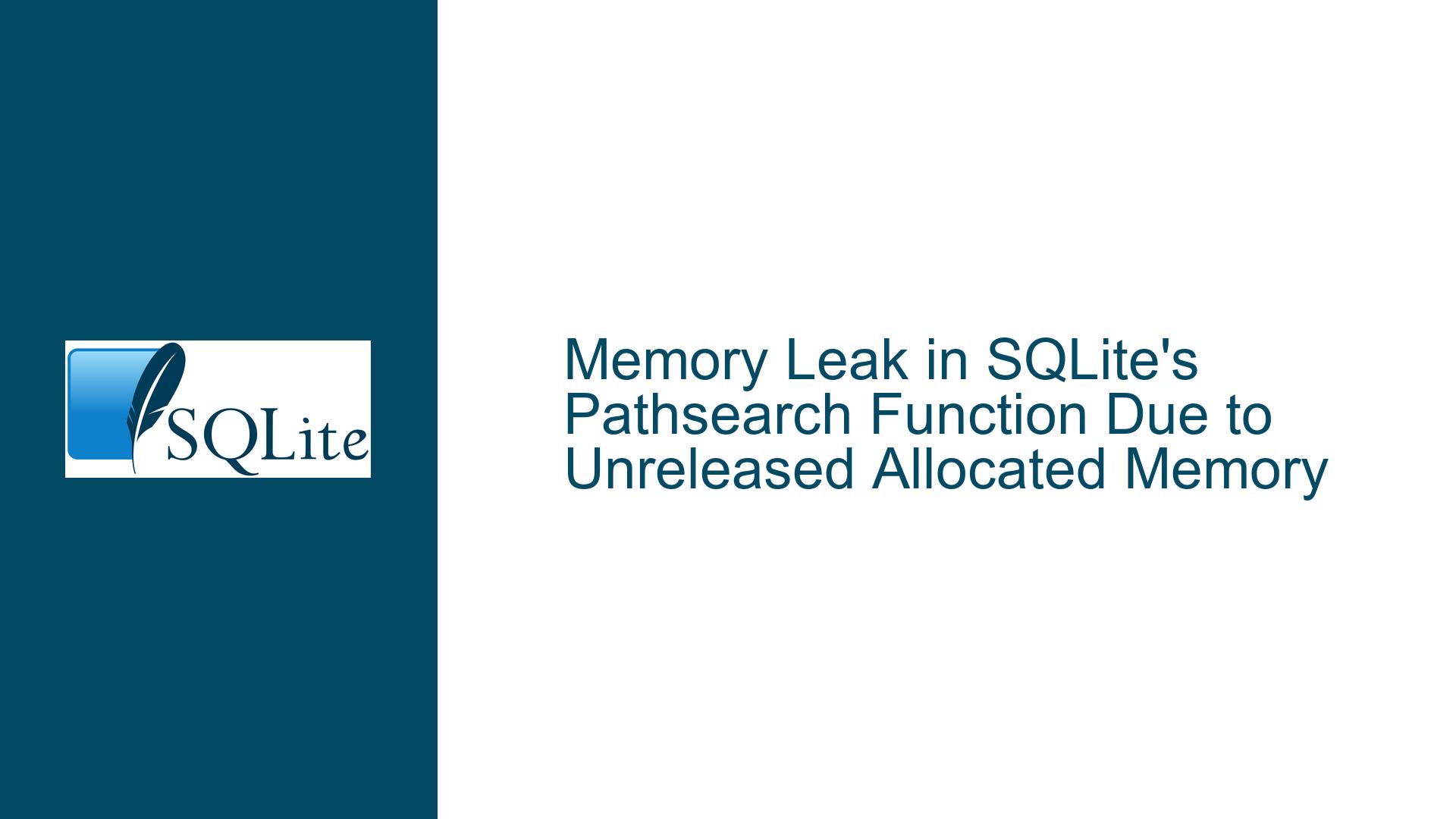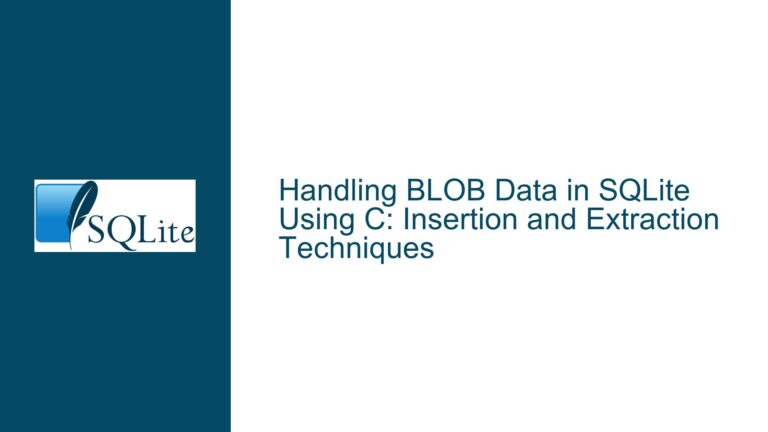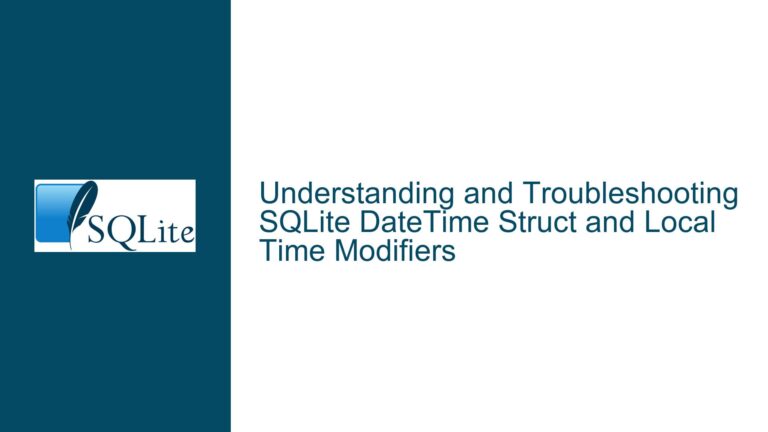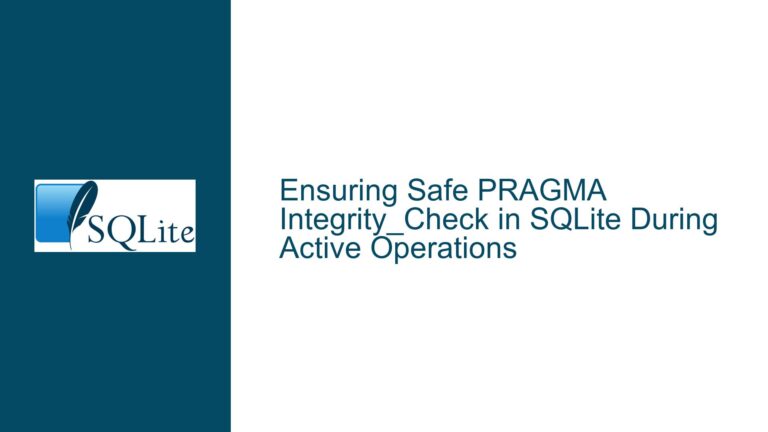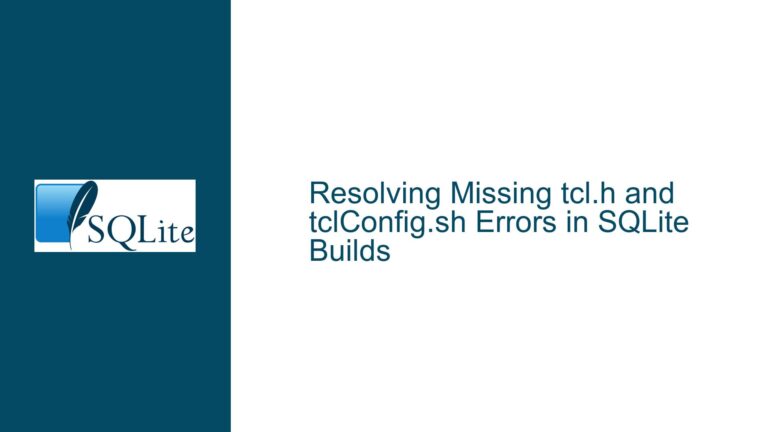Memory Leak in SQLite’s Pathsearch Function Due to Unreleased Allocated Memory
Memory Allocation in Pathsearch Function Without Corresponding Deallocation
The core issue revolves around a memory leak in the pathsearch function within the SQLite codebase, specifically in the lemon.c file. The function is responsible for searching a path list to locate a file, and it dynamically allocates memory to store the constructed path. The memory allocation occurs at line 3538 with the following code:
path = (char *) malloc(lemonStrlen(pathlist) + lemonStrlen(name) + 2);
This line allocates memory to store the concatenated path of pathlist and name, with additional space for a null terminator and a separator. While the function correctly deallocates memory for other allocations (e.g., at line 3553), it fails to release the memory allocated for path. This oversight leads to a memory leak, as the allocated memory is never freed after its use, particularly after the tplt_open function completes its execution.
The path variable is used exclusively by the tplt_open function, which opens a template file based on the constructed path. Once tplt_open finishes its operation, the path variable is no longer needed, yet the memory it occupies remains allocated. Over time, repeated calls to the pathsearch function can result in significant memory consumption, degrading the performance of applications relying on SQLite, especially in long-running processes or environments with limited memory resources.
Unreleased Memory After tplt_open Function Execution
The primary cause of the memory leak is the absence of a corresponding free call to release the memory allocated for the path variable. In C programming, every dynamically allocated memory block must be explicitly freed using the free function to prevent memory leaks. The pathsearch function allocates memory for path but does not deallocate it, even though the memory is no longer required after the tplt_open function completes its task.
The tplt_open function uses the path variable to open a template file, but it does not assume ownership of the memory. Consequently, the responsibility for deallocating the memory lies with the pathsearch function. However, the function fails to fulfill this responsibility, leading to a memory leak. This issue is particularly problematic in scenarios where the pathsearch function is called repeatedly, such as during the generation of multiple SQLite parser files or in applications that frequently invoke the SQLite parser generator.
The memory leak can be exacerbated in environments where the pathsearch function is invoked frequently or where the pathlist and name strings are large. Each invocation of the function allocates additional memory that is never released, gradually consuming available memory resources. Over time, this can lead to increased memory usage, reduced system performance, and, in extreme cases, application crashes due to memory exhaustion.
Implementing Memory Deallocation After tplt_open Function Completion
To resolve the memory leak, the pathsearch function must be modified to include a free call for the path variable after the tplt_open function completes its execution. The following steps outline the necessary changes:
Identify the Point of Deallocation: The
pathvariable should be deallocated immediately after thetplt_openfunction call, as the memory is no longer needed once the template file is opened. This ensures that the memory is released as soon as it becomes redundant, minimizing the risk of memory leaks.Add the
freeCall: Insert afree(path)statement after thetplt_openfunction call. This ensures that the memory allocated forpathis properly released. The modified code should look like this:path = (char *) malloc(lemonStrlen(pathlist) + lemonStrlen(name) + 2); // Construct the path and call tplt_open tplt_open(path); free(path); // Release the allocated memoryVerify the Fix: After implementing the change, verify that the memory leak is resolved by testing the
pathsearchfunction in various scenarios. Use memory profiling tools to monitor memory usage and confirm that the allocated memory is properly released.Consider Edge Cases: Ensure that the
freecall is executed even if thetplt_openfunction encounters an error. This can be achieved by placing thefreecall in afinallyblock or using agotostatement to ensure that the memory is released before the function exits.Update Documentation: Document the change in the codebase to inform other developers of the memory management requirements for the
pathsearchfunction. This helps prevent similar issues in the future and ensures that the codebase remains maintainable.
By implementing these changes, the memory leak in the pathsearch function can be effectively resolved, improving the overall performance and reliability of applications that rely on SQLite. This fix not only addresses the immediate issue but also reinforces best practices for memory management in the SQLite codebase, ensuring that dynamically allocated memory is properly released when no longer needed.
Conclusion
Memory leaks can have significant consequences for the performance and stability of applications, particularly in resource-constrained environments. The memory leak in the pathsearch function of SQLite’s lemon.c file is a prime example of how overlooked memory management issues can lead to degraded performance over time. By identifying the root cause of the leak and implementing a straightforward fix, developers can ensure that the pathsearch function operates efficiently and reliably.
The key takeaway is the importance of diligent memory management in C programming. Every dynamically allocated memory block must be paired with a corresponding free call to prevent memory leaks. By adhering to this principle and thoroughly testing code changes, developers can maintain the integrity and performance of their applications, even in the face of complex memory management challenges.
